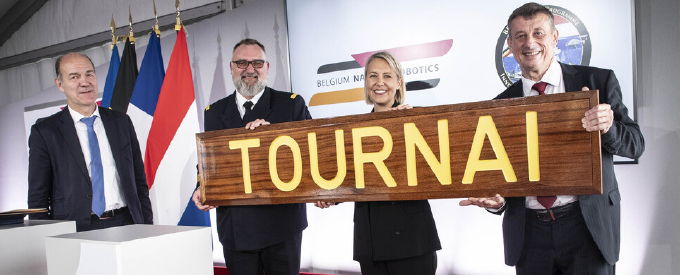2024-08-08
Tournai Joins Belgium’s Robotic Mine-Sweeping Fleet
The skies over Concarneau, France, buzzed with excitement on July 2, as the Belgian Navy celebrated a major milestone. The third of 12 new mine countermeasure vessels, named Tournai, was officially launched. The state-of-the-art vessel, built under the rMCM programme, is a crucial addition to the Belgian Navy’s fleet, enhancing its ability to clear dangerous mines and keep vital sea lanes safe.
The launch ceremony, attended by dignitaries including Belgian Minister of Defence Ludivine Dedonder, marks a significant step forward in the rMCM programme’s ambitious goal of delivering 12 vessels to both the Belgian and Dutch Navies.
The Tournai, the third ship in the Belgian-Dutch rMCM programme and the second for the Belgian Navy, is slated for delivery to Belgium in 2026.
The first ship in the series, the Oostende, also destined for the Belgian Navy, was launched on March 29, 2023, followed by the Vlissingen, intended for the Royal Netherlands Navy, on October 19, 2023.
The fourth vessel, Scheveningen, the second for the Dutch Navy, was laid down on July 19, 2023, and is scheduled for launch in December 2024.
The Oostende is set for delivery in Zeebrugge, Belgium, in the summer of 2025. Subsequent deliveries will occur at a pace of two ships per year, continuing until mid-2030.
Innovative Maritime Solutions
The rMCM programme was awarded in 2019 to Belgium Naval & Robotics, the consortium formed by Naval Group and Exail, as part of an international competition.
It provides for the supply to the Belgian Navy and the Royal Netherlands Navy of 12 mine countermeasures vessels, as well as around 100 drones integrated into a toolbox to equip the vessels.
In September 2023, France, Belgium, and the Netherlands signed a Memorandum of Understanding (MoU), granting France the right to use the rMCM ship design to equip the French Navy with six vessels. Thales will oversee the onboard Unmanned Aerial Vehicle (UAV) system for France.
The programme represents a milestone in European defence cooperation, showcasing the ability of European nations to collaborate and share a solution poised to become the standard in mine countermeasures for not only the Belgian, Dutch, and French navies but also for other partner navies across Europe and globally.
Naval Group Leadership
Naval Group, as overall architect and prime contractor, is responsible for the design of the ships, integration, testing and commissioning of the mission system (combat system and mine countermeasures system).
Kership, a joint venture between Naval Group and Piriou, is the industrial prime contractor for the 12 ships, which are being built in Concarneau and Lanester.
Exail, as a co-contractor, is responsible for the UAV mission system, with the majority of production taking place in Ostend, Belgium.
The maintenance of the ships will be carried out in Belgium through a close collaboration between the Belgian Navy and Naval Group Belgium, supported by its partner Flanders Ship Repair in Zeebrugge.
The specialised mine warfare vessels will be the first to carry and deploy a combination of surface drones (approximately 12 metres and 18 tonnes), underwater drones, and aerial drones.
The vessels will employ a fully robotic system to detect, classify, and neutralise mines. Designed to withstand underwater explosions, they feature extremely low acoustic, electrical, and magnetic signatures, perfectly suited to their mission requirements.


No Comments